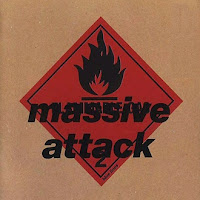Can you make music for the mind without discriminating against a body that longs to dance? Can you mix reggae, soul, dub, hip-hop and electronica together without starting a huge fight? And, can you create an album that is so innovative and so divergent that it can still be considered 'fresh' today, two decades after its release, while many listeners plainly call it a 'Classic'? Sure you can – especially if you go by the name of Massive Attack.
Massive Attack, from Bristol in the UK, are popularly known for their enchanting, yet mournfully unsettled hit named 'Teardrop', which came off their third album Mezzanine, in 1998 (it's the theme-song from House– you have to know it!). Blue Lines was their debut album, released back in 1991. Unlike 'Teardrop', Blue Lines didn't gain widespread popularity instantly - it took a few years instead (note that nothing on TV really had a soundtrack like House does back then...).
While the Brit's and international critics who were 'in-the-know' immediately celebrated the release, international listeners were yet to make space for anything so progressive – they'd have to get over their fixation upon the conventional tracks of rock and pop stars, like Bruce Springsteen and Madonna, first.
So, what really caused the mainstream attention deficit? Well, beginning with rudimentary matters, Massive Attack initially lacked celebrity “Headline” potential. As a collaborative venture, many of the tracks on Blue Lines featured guest performers, including vocalists Horace Andy and Shara Nelson as well as Tricky Kid rapping, who weren't (yet) internationally renowned nor central to the work as a whole. In effect, widespread reception might have been muffled by the fact that there was no particular 'persona' to follow. But, what if I were to tell you that this sense of 'anonymity' actually contributes to the overall atmosphere and appeal of this album, just as much?
Putting aside the issue of unfamiliar personalities, Blue Lines could also be thought of as a rather challenging listening experience because of its eclectic soundscape. The album turned out to be a landmark experiment in genre-mixing and sound-layering, eventually becoming renowned for inventing the 'trip-hop' genre: a smooth and ambient mix of hip-hop and electronica.
But, being debut experimenters, Massive Attack actually took the genre-mix a little further than the definition specifies: bridging soul and hip-hop together, with the help of a little bit of reggae, dub and a whole lot of electronica.
In essence, this album is loaded with bits of cool, calm and collected pieces of sound that have been manipulated into a brooding urban tapestry. So, aside from the soulful vocals and rapping, there are samples of orchestral strings, keyboards, other miscellaneous electronic sounds, a variety of percussive instruments, including triangles, cow-bells, cymbals and shakers, some general chatter and even whales (well, I could hear whales!). These diverse sounds are layered to create some very chilled, flowing and sophisticated beats. There's a rather dizzying array of stuff to tune into, but it turns out to be more calming than overwhelming because its all pretty slow – quite a relaxing audio feast!
So, why didn't the smooth genre-mixing attract international and mainstream ears instantly? What else hampered the attack? I put it down to all the chilled tempos and the complex and fragmented structure of the tracks and album in its entirety. Though, like the sense of 'anonymity' mentioned above, these things also add appeal for those with curious (or really relaxed) ears, making this an album an outlet for the mind, as much as it is for the ears and feet.
You're likely to feel like you're tuning into fragmented streams of consciousness if you listen to the tracks in order (or out of order!): there aren't really any plots or direct messages in the lyrics, only bits and pieces of organically assembled utterances and sounds. It often takes some effortful attention to draw out the structure and meaning of a track and to become familiar with the verses and chorus – if they're even there? (I really feel like I'm about to use the word 'postmodern' here...).
What I'm trying to say is, some of the tracks aren't that compelling in terms of popular music structuring – the lyrics are quite poetic and thought-provoking but the messages can be hard to find and most of the tracks aren't that 'catchy'. The lyrical content is often sparse and, at times, incomprehensible because there is so much else calling to be tuned into at the same time, but – the lyrics are there if you listen hard enough. There's actually a rather cynical social critique about the lack of individual control within the harsh realities of modern society flowing throughout, e.g. "It's a concrete jungle – evil in the town" or "The freak-show...I can't do nothing about".
Well, that's just another catch. One of the best things about this album is that it's full of atmosphere and subtle nuances into which you don't need to engage completely to understand, but each listen provides further insight. It's music that doesn't really interfere with whatever else you're up to or get stuck in your head for hours after listening. The layering of styles, instruments and voices simply frees your mind and inspires your curiosity.
For me, the singles, 'Daydreaming', 'Be Thankful For What You've Got', 'Safe From Harm' and the hit (and 'punny' answer to Franz Schubert's 'Unfinished Symphony'), 'Unfinished Sympathy', are the standout tracks. But, I'd also include the environmentalist anthem 'Hymn of the Big Wheel' (with its whale sound-effects and indigenous drones) and the title track 'Blue Lines' (with its 'department-store' music vibe) because they are both so unique and interesting to listen to.
Blue Lines is an album that you can dance to, think to and which offers up something new, with a very liberal “take what you will” attitude, every time you listen to it.




